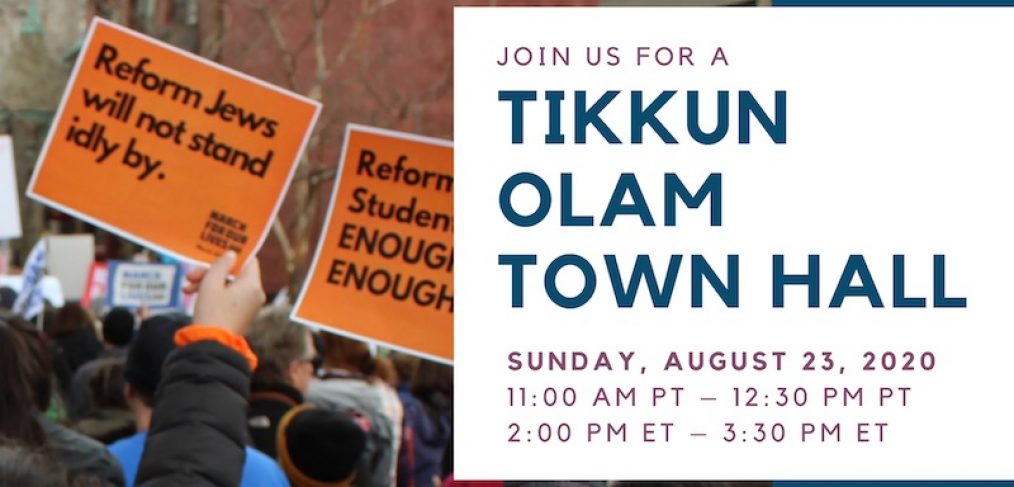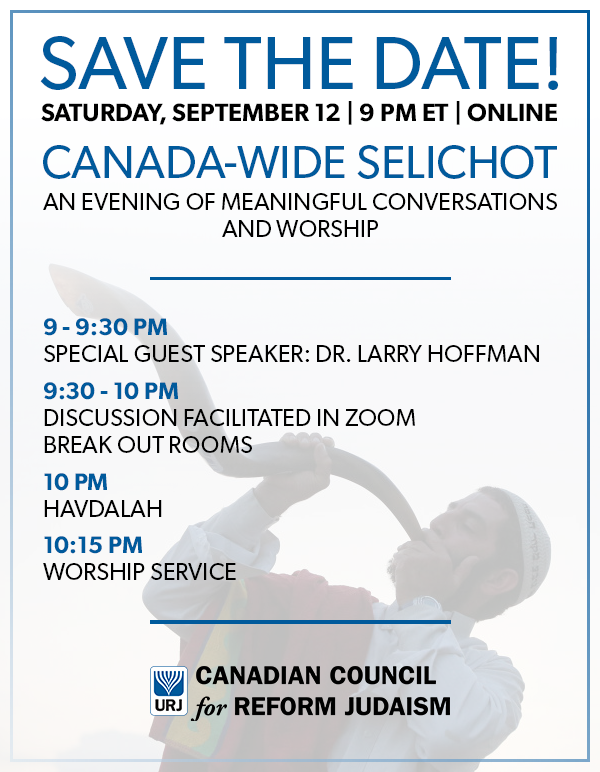Yom Kippur Morning Sermon – 2021/5782
By Rabbi Mark Glickman
There are many rabbis who choose a single theme to drive all of their Days of Awe sermons each year. I typically don’t do that – at least not intentionally – but this year, one seems to have emerged on its own. The theme: “It has been a hell of a year.”
I don’t need to recount all of the biological, sociological, economic, emotional, and spiritual factors that have made this year so difficult – you lived them all yourselves. What I will note is the frustration that many of us – particularly here in Alberta – have felt in recent weeks over the fact that this pandemic could have been far closer to its end had more of us worn masks and gotten vaccines in our arms. Sadly, as you know, some of our neighbours have refused to do so, the resistance is growing in both magnitude and volume, and we’re all suffering as a result.
I’m not a physician, so this sermon won’t tout the medical benefits of masks and vaccinations. The medical community has already rendered those benefits an established fact. I am, however, a rabbi, so I would like to share with you a few comments about this situation from a Torah perspective.
First, as the leaders of most Jewish denominations from left to right have affirmed, getting vaccinated and wearing masks are sacred religious obligations. There is a concept in Jewish law that our Temple board and staff have cited in many letters and emails to you about our COVID-19 policies – it’s called pikuach nefesh. This refers to the fact that, according to Jewish law, you break almost any commandment in order to save a human life. There are a few exceptions: you’re not allowed to murder someone or commit idolatry or incest under any circumstances, but even those exceptions (particularly the idolatry one) become a little fuzzy when these laws get applied. Overall, however, saving people’s lives – and even protecting people against a potential risk to their lives – is primary in Jewish law. In Judaism, you do anything you need to do – anything – in order to save people’s lives and protect them from danger.
Many anti-vaxers and anti-maskers these days object that masking and vaccination requirements impinge on their freedoms. To this, Judaism has a clear reply: You bet they impinge on your freedoms, because in a civilized society, you’re not free to kill people, and you’re not free to imperil their lives. We limit freedoms all over the place, because that’s how we reduce unfair harm to other people. The medical community has shown us beyond a doubt that masks and jabs save lives, and Judaism rightly points out that this renders all discussions of freedom moot.
In fact, to tell you the truth, Judaism doesn’t really care about freedom. In Canadian law, of course, we have the Charter of Rights and Freedoms, and I grew up in the United States studying the Bill of Rights – for a couple of centuries now, rights and freedoms have been a common theme in Western Law. In Judaism, however, we don’t have a Charter of Rights or a Bill of Freedoms. Instead, the most widely known and widely celebrated passage of our scripture is the Ten Commandments, and we Jews spend a lot of time thinking about how to do mitzvot. Mitzvot are commandments, and Jewish scripture has 613 of them.
The central question of Jewish life, in other words, is not what we get to do, but what we should do. And particularly during times of worldwide crisis such as this, it is essential that we keep this question in mind. Clearly, Canadian law, as well as the laws of most other countries, give you the right to go around unmasked, and they give you the right not to get vaccinated…but who cares? The question we Jews should be asking – and here I’ll say the question we all should be asking – is “What should we do?” And what we should do is get vaccinated.
Uvacharta bachayyim, the Torah tells us – Choose life! Without qualification. It doesn’t tell us to choose life as long as it’s comfortable. And it doesn’t tell us to choose life as long as it’s convenient. And it certainly doesn’t tell us to choose freedom before we choose life.
Vaccines and masks save lives. Period. That, our tradition teaches, should be the end of the discussion. They are important for us all, even at the cost of a few minor elements of our personal freedoms. Get vaccinated; wear a mask. It is your sacred obligation.
My second comment comes as a result of the nauseating increase in the number of people these days who are turning to religion to justify their resistance to masks and vaccinations. Even though, thankfully, most major religious denominations have called for their adherents to get their shots and cover their faces, still there are those who resist taking these steps in the very name of religion. You see it locally, as churches and religious leaders here in town openly defy masking mandates and other COVID restrictions. They say that God will take care of us provided that we pray, as if we have no obligation to the health of our community. They say that faith rather than medicine will bring true healing. They say that vaccines bring contamination rather than safety for us all. One of these churches actually approached us here at Temple asking to rent our facilities. Needless to say, their request didn’t go very far.
Everywhere, people are seeking religious exemptions to allow their children to go to school unmasked and unvaccinated. In fact, the state of Vermont in the U.S. used to allow both religious and non-religious exemptions for the vaccinations of their schoolchildren. Recently, however, they removed the non-religious exemption, so that the only way you could get out of having your kid vaccinated was for religious reasons. And the moment they did that – wouldn’t you know it – the number of Vermonters who had gotten religion suddenly jumped more than sevenfold, and many people rightly began wondering whether this was really about religion in the first place.
It’s almost as if, in many peoples’ minds saying that something is based on your religion is supposed to give it automatic credence – automatic immunity from all logic and ethical obligations. Because it’s your religion, you have the right to imperil me? Because it’s your religion you have the right to delay our return as a society to normal life? Because it’s your religion, you have the right to infect me with your viruses? To all of these questions I say no, and I add a request that you please stop making these arguments because they all give religion a very bad name.
Look, we can disagree about a lot with those who adhere to other religions. We can agree to disagree about what day of the week the Sabbath should be, and whether belief or deeds are most important, or even about whether the messiah has come yet. I do it all the time in my interfaith work, and I love it. But this doesn’t mean that we should give automatically give credence to every single religious view. As a teacher of mine once said, we should be open minded, but not so open minded that our brains fall out. Even in Judaism, while we don’t expect non-Jews to agree with everything, there are certain religious obligations that our tradition says apply to all people – Jews and non-Jews alike. These are the “Noachide Laws,” the seven commandments given to Noah and his descendants – to all of us, in other words. You’re not allowed to murder; there must be a community-wide system of justice; you can’t be cruel to animals. There are a few others, too. The point is that, even as we disagree, Judaism teaches that there is fundamental code of human decency to which we should hold all people accountable. And if their religion teaches otherwise – that gratuitous bloodshed is OK, for example, or that injustice is permissible, or that incest should be allowed – then their religion is wrong.
This is particularly important at a time such as this. When people argue that their religion allows practices that endanger us, when people suggest that God wants them to prioritize their own freedoms over the safety of others, when people describe life-saving vaccines as impure and unholy – then we should respond without hesitation that they and their religions are wrong.
Let me mince no words. Any religion that fails to prioritize human life is a bad religion. Any religion that encourages its adherents to unnecessarily imperil others’ health and safety is a bad religion. And any religion that demands its adherents check their brains at the door of their church, mosque, or synagogue is certainly a bad religion, too. We rightly tend to be wary of using such language, but if we can’t ever use it, then we might as well throw away the central teachings of our own Jewish traditions. If every religious idea is of equal value, then none of them are worth a damn to begin with.
So observe Shabbat on Tuesday, for all I care – if you don’t choose life, then your religion has no part in contemporary public discourse. Celebrate National Cucumber Day as your most solemn religious holiday if you want, but if your religion advocates policies that unnecessarily endanger people’s lives and livelihoods, then please don’t sully my public square with your destructive religious ideas. And if, in the name of your religion, you are going to reject science, reject medicine, and reject the great achievements and innovations of the human mind, then please know that I and people like me will oppose the imposition of your religious will however we possibly can. As a Jew who takes my Judaism seriously, I have no other choice.
Finally, most of us know people who refuse to mask or get vaccinated. What are we supposed to do in response? How can we talk to these people…especially since they so often seem to speak such a different language from the rest of us?
Well, for starters, to persuade them, I would not suggest that you share this sermon with them. Take it from me, the whole “bad religion” thing, the whole “check your brain at the door” thing…they tend not to be very effective rhetorical tools with these people.
Instead, I would suggest that you approach these people with love rather than rhetoric – with patience and sensitivity rather than with argument, for even the most ironclad arguments tend not to do much good here.
Let’s remember that even if there are no good arguments against vaccinations and masking, there are reasons the opponents feel the way they do, and we need to strive to understand them. Many who are reluctant, hesitant or refusing to get vaccinated are members of minority cultural and ethnic groups who have deep seated mistrust of public institutions. Their distrust is destructive, of course, but understanding it and being sensitive to it can be among our most powerful tools to combat it. Others are part of the majority culture, but feel threatened for other reasons, and still others find support, friendship, and solidarity in the community of their fellow mask and vaccine resistors. For them, such support, friendship, and solidarity are gifts more precious than gold. Some people suffer from skewed thinking, prioritizing freedom and autonomy over our obligations to ourselves and one another. For them, patient and respectful dialogue will be key.
It’s difficult, of course, because, if you’re like me, your initial reaction is sometimes to scream at these people or to wring these people’s necks rather than engage in patient dialogue. Those responses might feel good for a moment, but they’re not likely to do much good.
Instead, let’s take the lead from the Talmud as to how to conduct what it called a “machloket l’shem shamayim,” a disagreement for the sake of heaven. The Talmud’s model for this was the School of Hillel, the ancient sage whose students always argued with their arch-rivals, the School of Shammai. In almost every case, the final decisions about Jewish law went with Hillel’s arguments, not Shammai’s. Why? Because Hillel’s students were kind and gracious, and because they always made sure to understand Shammai’s views completely, even going so far as to teach those opposing views before their own.
In other words, they were gentle; they listened – carefully; they argued to learn, not to preach. And in so doing, they were disagreeable, but disagreeable in a holy manner, disagreeable in just the way that God wanted.
This doesn’t mean, of course, that we need to become doormats. Arguing against and opposing bad ideas is a matter that is nothing short of life and death these days. And it’s imperative that we advocate for safety on behalf of all of our public institutions.
But with individuals, we need a kinder strategy. Let’s approach these people gently, and with open ears, minds, and hearts. Let’s approach them with love. It’s unlikely to bring sudden change, it might not bring change at all, and whatever impact you do have will likely take a lot of time and energy. But they too are children of God, they too have much to teach, and even though they are mistaken, demonizing them won’t achieve a thing – only humanizing them will.
It has been a hell of a year. And just when we thought things were about to get better, they got worse again. We can fix this, my friends – the virus is strong, but we can be stronger, and overcoming it will demand that we all do our parts. It is a herculean task, but I have faith that we can succeed. To do so, let’s cover our faces and get those shots, let’s resist the exploitation of God’s name for unholy purposes. Let’s thank our health care workers rather than make their lives more difficult, and let’s argue with love and respect.
On this day of awe and turning, we dare not abdicate these sacred responsibilities.
Shanah Tovah



